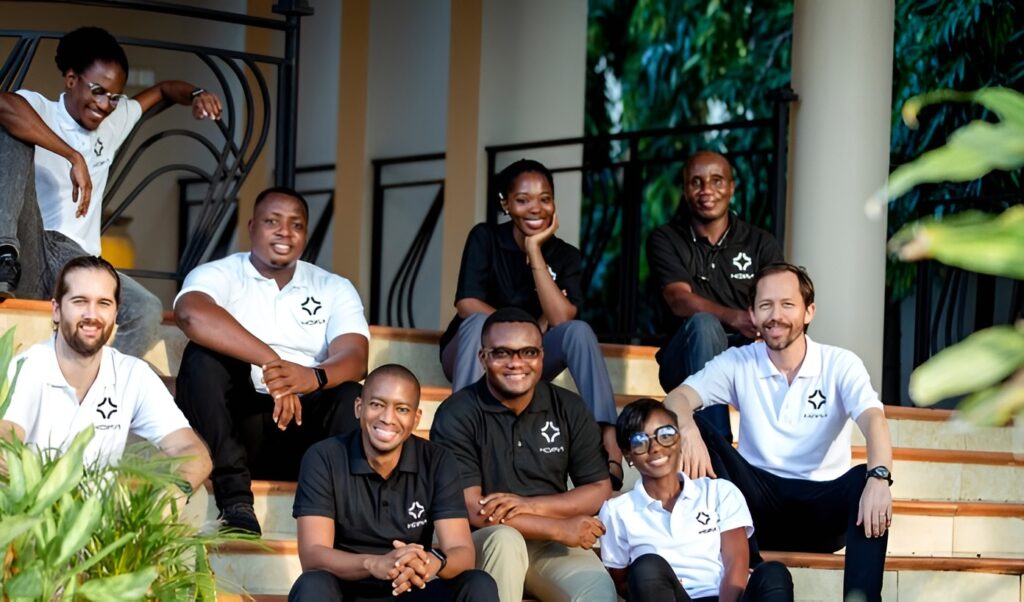The Kofa Team. Image Credits: Kofa
Kofa is Ghana’s foremost startup in the battery network solutions sector, having gained renown for its innovative solutions. The energy company aims to bring about an ecosystem of affordable, customer-driven electricity network powered by portable batteries and renewable energy.
Erik Nygard, along with the startup’s initial founding team, founded Kofa in 2021 after resigning from his CEO role at LimeJump, a British energy resource aggregation platforms. Kofa is on a mission to tackle challenges surrounding access to clean and affordable energy.
Since its inception in 2021, Kofa has deployed 10 charging stations, 500 Kore2 batteries, and 150 Jidi bikes in Accra. With 7,000 more bikes in the pipeline, Kofa plans to operate in four cities and expand to Kenya and Togo.
Ecosystem
While the global need for reliable and sustainable energy increases globally, Kofa operates in Africa’s heavily challenged, but resilient, energy industry. Sub-Saharan Africa currently deploys backup generators, accounting for 9% of electricity in the region. Furthermore, motorcycles in the region consume an estimated 60 billion litres of petrol annually, with the motorcycle industry currently valued at $30 billion.
By focusing on creating efficient batteries and robust charging networks, Kofa aims to solve the high costs and pollution associated with petrol systems. It’s goal is to enable a seamless transition to clean energy for small businesses and delivery drivers across West Africa.
Business Model
Kofa’s “Swap & Go” network is its main product. Kofa Swap & Go system is a distributed network of batteries and swap stations that provides immediate access to a fully-charged battery in seconds. Users can simply swap out their drained batteries for fully charged ones at these conveniently positioned swap stations.
Long charging times for electric cars and other battery-powered gadgets are a problem that this concept attempts to solve. Kofa has developed the Kore2, a high-capacity battery system, along with a comprehensive battery swapping network. CEO Erik Nygard maintains that Kofa’s batteries are at least 30% more cost-effective than petrol, providing versatile and high-performance power.
In order to lessen dependency on fossil fuels and encourage the use of greener energy sources, Kofa’s batteries are made to support a variety of high-energy-demand applications and provide dependable and reasonably priced access to power, particularly in places with shaky grid infrastructure.
Batteries will be available at exchange stations positioned in key urban areas throughout Africa. The battery network is made up of identical battery packs, each weighing roughly 14 kg and having a 2 kWh capacity. These can be linked to an inverter, which can power AC loads for backup power or other useful purposes, or they can be put straight into an electric motorcycle.
Kofa has also forged a partnership with TAILG Group, a prominent electric vehicle company from China, to launch the Jidi electric motorcycle, powered by Kofa’s battery swap technology. This collaboration aims to deploy 200,000 electric vehicles and over 5,000 battery swap stations across Africa by 2030. The first orders of the battery swap electric motorcycle called Jidi are expected to arrive in Ghana at the end of 2023. Based on the advantages of Kofa batteries and battery swap networks, the Jidi will reduce rider costs by up to 30 per cent.
Funding
Kofa expanded their battery-swapping network in Ghana in 2024 by collaborating with impact investor PASH Global. The Shell Foundation and the UK Government’s Transforming Energy Access (TEA) platform have contributed £6.15 million (US$8 million) to fund this growth. Up to 100 switch stations and 6,000 batteries are to be distributed throughout Ghana as part of this project.
“This is a major milestone that will help accelerate EV adoption across Africa and play a major part in reducing urban pollution; motorcycles alone emit over 50 million tonnes of CO2 annually. TailG is the first major EV OEM entering Africa with a ready solution for scale by partnering with Kofa to provide the battery swap & go solution. We are really excited to help enable this,” said Erik Nygard, CEO of Kofa Technologies.
As the world gradually becomes electrified, Kofa sees its battery network as a critical support and optimization tool to the local electricity grid. Instead of needing to over-invest in expensive electricity grid infrastructure often needed to meet peak customer demand, Kofa believes its battery network will be able to deliver this access cheaper and faster in the short term, thereby allowing more optimal planning to be done when investing into grid infrastructure when the time is right.
Kofa currently has a big goal to reach 10 million customers across Africa actively using its battery network, equivalent to offsetting 10 million tonnes of CO2 per year by displacing petrol. This would also deliver around $2 billion in annual customer savings, as the battery network is cheaper than using petrol.

